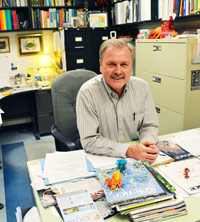Meet Primary Investigator Dr. Donald Mykles

Every corner of Dr. Donald Mykles’ office contains objects of tribute to his life’s work. Crab magnets stuck to metal shelves peer across the room at rows of crab models and toys nestled between crab books. Over the years, Mykles' friends, colleagues, students and researchers gave him these crustacean decorations that now adorn his work space.
The phenomenon of molting in crustaceans fascinated Mykles as an undergraduate at UC-Santa Barbara and a graduate student at UC-Berkeley. Four decades later, as a professor of biology and director of the University Honors Program at Colorado State University, he shares his passion for crustaceans with other scientists and student researchers. “I always liked science, but I didn’t know what I was going to do,” Mykles reflected. “It wasn’t until I went to college and got interested in marine biology, and so that sent me on this path of crustaceans.”
Mykles first learned about the land crab when he worked on his post-doctorate at the Oak Ridge National Laboratory in Tennessee. Studies on the species since the 1950s fleshed out information on the biology and physiology of the animals, but Mykles saw there was more to learn. “It’s been a lifelong goal of mine to figure out what’s going on and understand more of the cellular and molecular mechanisms underlying the process,” Mykles explained.
That goal led Mykles to establish the Crab Lab in 1985 when he arrived at Colorado State University as a biology faculty member. “I wanted to continue working on this area of research, and being in a landlocked state required me to work on a species which allowed me to keep them here,” Mykles explained. He oversees all research projects in his lab, works on grants and coordinates collaboration with other labs.
Mykles built the Crab Lab into an area that promotes research and learning for PhD. students, graduate students, and undergraduates. “Dr. Mykles is a huge student advocate,” acknowledged Megan Mudron, a graduate student in the lab. “He really believes in the students and allows them to do as much as they want to, so for that reason we have a lot of productivity.” From meeting with students about projects, to talking with them about classes to take, Mykles invests in those with whom he works, including undergraduates, who participate in much of the lab's key research. Many students design and complete their own projects by the time they graduate. “I could tell there were a lot of undergrads working, but it seemed like developing undergrads into scientists was a major focus of Dr. Mykles,” affirmed Matt Donovan, an undergraduate researcher. Each student comes away with new skills, and each project reveals more about crustacean molting and regeneration, adding more to current knowledge of the species. “It’s a fascinating process and very complicated,” Mykles said. “And, as we learn more about it, it gets more and more complicated.”
Primary Investigator
- Dr. Donald Mykles
